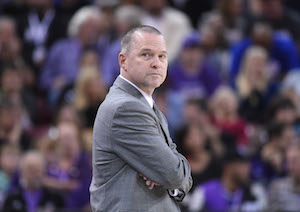The NBA has a new champion, and their name is the Golden State Warriors.
The NBA’s most efficient team throughout most of the season on both offense and defense and boasting the league’s MVP, the Warriors were just too much to handle – even for LeBron James.
King James had to endure watching his supporting cast drop like flies throughout the latter half of the playoffs, and finally as the last few surviving pieces slowly but surely ran out of gas, culminating in Tuesday night’s title-clinching effort by Golden State against LeBron’s Cleveland Cavaliers.
But as the NBA prepared earlier that day to celebrate the first Warriors championship in over 40 years, quietly, in their own corner of the NBA universe, the Denver Nuggets were introducing a move that they hope they will be celebrating in the near future: the hiring of Michael Malone as their new head coach.
In the end, it was Melvin Hunt whom Malone beat out for the job, with old retread Mike D’Antoni finishing an apparent distant third.
Malone has always been a good communicator. It came across in the press conference and in the glowing reviews from former players and fellow coaches. As Doug Ottewill noted yesterday of All-Star center DeMarcus Cousins’ comments on Malone, he’s simply, “Real.”
The compliment draws to mind another, more famous NBA coach, who just happened to be hoisting a trophy last night: Steve Kerr.
Unlike Kerr, Malone arrives in Denver with almost no fanfare. Unlike Kerr, Malone arrives in Denver not as a hot head-coaching commodity but as the somewhat head-scratching pick of the final team limping to the coaching-hire finish line.
But like Kerr, Malone comes to the job understanding that coaching in today’s NBA is far more about the ability to get through to talented players than it is about X’s and O’s. How much more?
“About 90-percent of coaching is getting the players to buy in,” former NBAer and current Nuggets analyst Scott Hastings told me. “The other 10-percent is the correct X’s and O’s.”
Along with Golden State’s considerable talent, it’s been Kerr’s ability to get his players to buy in to whatever he decides to do that put them into the Finals. Again and again, Kerr’s mid-series adjustments were on full display, often to the detriment of individual players, but they all believed in what Kerr was trying to do.
Denver’s brass can squint hard enough and see a similar team that’s possible to construct in Denver, one that on the surface was constructed without much fanfare surrounding their players. They see a few top-10 picks and the types of players that even they could acquire via trade or free agency, under the right circumstances.
And to see Golden State that way, Kerr has to be a huge catalyst. Steph Curry’s MVP effort aside, the team didn’t exactly flounder when Curry was absent from the lineup. Other great players had to step up… But not many of them were considered as ‘great’ as they are now before Kerr.
Whatever quality Malone possesses that allowed him to be known as the only coach DeMarcus Cousins ever liked, the Nuggets hope he can bring that quality with him to a roster that has been notoriously difficult to mold.
If the Nuggets believe that they can build a team of ‘good’ players that can be made ‘great’ by the right set of circumstances, then they must see Malone as a substantial cornerstone of that plan.
Like Kerr, he communicates well and has the basketball acumen to match. But, as so many have already pointed out, he lacks perceived credibility and likely won’t have the luxury of a ready-made roster right off the bat.
Strategy in professional sports has always been an exercise in thievery; count the Denver Nuggets among the teams who will study the Warriors as a model that didn’t require top-three draft picks to construct.
One has to imagine that the Nuggets learned their lesson about communication after the Brian Shaw debacle, and if that means Malone is their Steve Kerr protégé, then they certainly are on the right track.
